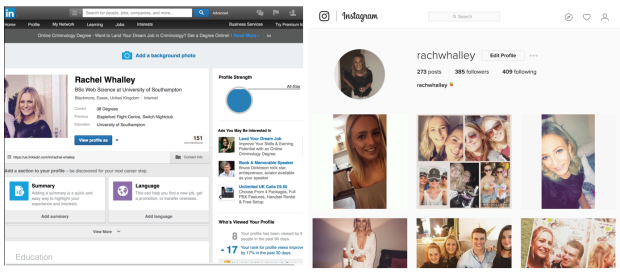Online identities is a topic I find particularly interesting as I’m basing my dissertation around it – but what actually is a digital identity? Costa and Torres described online identities as an activity centralised around “presentation and reputation” (2011). Suggesting that our online identities are managed representations of our true selves. An idea I think is interesting as we do this in real life too, acting differently in varying situations, for example using age appropriate language around children vs. using swear words around adults.
I believe one of the driving forces behind have multiple identities, or personas (The Internet Society, 2017), online is the attraction of anonymity (Krotoski, 2017). For example having a personal Facebook account that is your true identity, but also having an Instagram account that posts cute pictures of puppies. Both are versions of your online identity but only one is publicly attached to you. Although I can see the benefits of choosing to remain anonymous, as it allows you to remain in control of what parts of your identity are available online and also easily explore various aspects of your identity, i.e. your love of cute puppies. However I personally prefer to just have the one.

Figure 1 – Comparison of my LinkedIn vs. Instagram profiles – created by Rachel Whalley
Krotoski (2017) raises an interesting point here by suggesting that having “multiple identities is lacking in integrity”. I agree with this statement as I think people who stick to presenting their true selves appear more trustworthy and authentic. I propose that a digital identity is formed on many social networking platforms, and each one’s purpose reveals appropriate aspects of ones identity. In my case this would be posting pictures of myself and friends on Instagram, updating statuses on Facebook for my friends to see and maintaining an up to date LinkedIn for potential employers to see. This is similar to the theory of fragmented digital identities (Costa & Torres, 2011), for example I wouldn’t necessarily want employers to see everything I post on Facebook, but the two profiles are still connected to my identity just with separate purposes and thus filtered content. It is easier to think of it as a network of your identity – a bit like a formation of a digital passport (O’Donnel, 2016).
This is something that can be seen in Fig 1. It is clear that both profiles are the same person and thus are portraying the same identity. However the LinkedIn profile focuses less on my personal life and more on my professional work and education history, whereas the Instagram one is very much centralised around my personal life. Personally I prefer to stick to the one online identity, but I can understand the perks of having multiple personas for privacy and anonymity.
Word count: 436
Reference list:
Krotoski, A. Online identity: Is authenticity or anonymity more important? Guardian. Accessed 21.02.2017. https://www.theguardian.com/technology/2012/apr/19/online-identity-authenticity-anonymity
O’Donnell, B. The Digital Identity Dilemma. August 10, 2016. Recode. Accessed 22.02.17. http://www.recode.net/2016/8/10/12413592/digital-identity-virtual-id-card-fido-web-api
The Internet Society. Manage your Identity. Accessed 22.02.17. http://www.internetsociety.org/manage-your-identity
Hi Rachel,
Thanks for an excellent post! I like the way that you describe what a digital identity actually is, often it can be a surprisingly slippery concept…
Costa & Torres talk about ‘fragmented’ digital identities, as you mention, is an interesting ‘halfway house’ between having one identity and many. I don’t think there are many people who would argue that some level of fragmentation is required, for example between your professional work and social platforms as you mention. Do you think that fragmented online identities are a helpful way to understand how people use online services?
Also, you mention that ‘can understand the perks of having multiple personas for privacy and anonymity’. Following that, can you image any circumstances in which you can consider yourself using multiple online identities?
Thanks again for a great post!
Mark.
LikeLiked by 1 person
Hi Mark!
Thanks for your feedback on my blog post! Personally I feel as though the “fragmented” theory definitely helps me to describe how I approach my digital identity but I think its a very individual thing and there are many approaches you could take!
In regards to your second question I think I would only engage with multiple online identities if it were for business purposes, if for example I needed a work Instagram account for social media marketing that was not affiliated with my own personal one!
LikeLiked by 1 person
Hi Rachel!
Thanks for your reply.
I agree totally that there are many individual approaches we can take to this issue of online identity. To what extent do you think that we actually have ‘informed agency’ with the growth of ‘real name’ policies such as Facebook or YouTube?
It is interesting that you create division between work and social use of online services. Does this mean that in your personal like you are more of a ‘resident’, but at work very much a ‘visitor’ getting a task done.
Thanks again.
Mark.
LikeLike
Hi Rachel, thanks for this great blog post. I meant to comment earlier but I was having some difficulties posting, hopefully they’ve been resolved now.
You mentioned that you believe a digital identity is formed on many social media networking platforms. I agree with this but I was wondering if you thought each platform was equal or did certain platforms contribute more to a person’s identity? Or perhaps their activity level on the platform? Personally, I find that you can gauge more about a person from their Instagram profile than their Twitter, but more from their Facebook than their Instagram for example. Do you think this might be because of the amount of information each platform requires users to submit or perhaps because users are more willing to divulge their identity on Facebook than on Twitter?
Thanks,
Ed
LikeLike